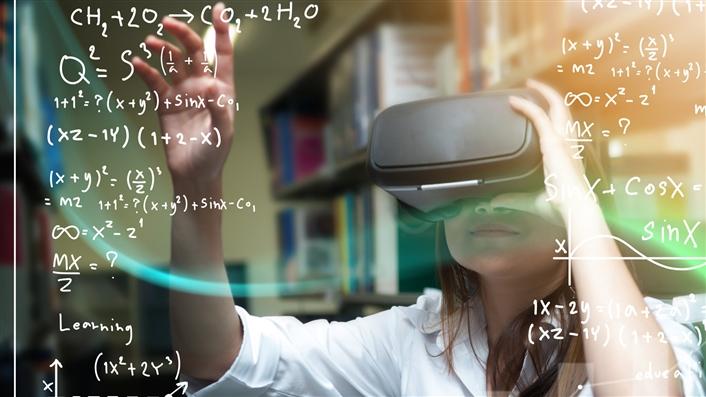A series of blog posts provides an in-depth exploration of virtual and augmented reality and the impacts of these technologies on higher education.

Philosophers across the ages have debated what constitutes reality. While today’s technological advances don’t completely reshape such arguments, they are bringing to life a wholly different kind of encounter, one in which humans can experience bygone eras, meet people who no longer exist, or travel to faraway places.
It should come as no surprise that many colleges and universities are experimenting with XR, or cross reality, which combines digital and biological experiences. After all, higher education is as much a laboratory as it is an institution. Those who continue to embrace technologies such as virtual reality (VR) and augmented reality (AR) will undoubtedly play a role in reshaping the educational environment; some will even redefine it.
What was once fodder for science fiction and, later, for futurists, is now going mainstream. Greater availability has led to a watershed moment for such technologies, where myriad possibilities and obstacles are now converging across a variety of disciplines. Nowhere is the potential for growth and complication more evident, perhaps, than in teaching and learning.
Over the past year, the Transforming Higher Ed column of EDUCAUSE Review has explored virtual and augmented reality in-depth. The series of comprehensive blog posts has been authored by Emory Craig, Director of eLearning and Instructional Technology at the College of New Rochelle and Co-Founder at Digital Bodies, and Maya Georgieva, Director of Digital Learning at The New School and Co-Founder at Digital Bodies. The pair have presented workshops on these emergent technologies and their use in educational settings since 2013, and they have examined trends in teaching methodologies, learning spaces, tech products, educator attitudes, and policies. Check out the series below, and follow us on Twitter (@EDUCAUSELI) as we explore this topic further.
- Outside the Boundaries: Exploring Virtual and Augmented Reality in Learning
- Introducing the VR and AR Series: Stepping Into the New Frontier of Learning Series
- A New World: VR and AR Tech Developments
- AR and VR in STEM: The New Frontiers in Science
- VR and AR: Driving a Revolution in Medical Education & Patient Care
- VR and AR: Transforming Learning and Scholarship in the Humanities and Social Sciences
- VR and AR: Designing Spaces for Immersive Learning
- VR and AR: Learners as Creators and World Builders of Our Immersive Future
- VR and AR: The Art of Immersive Storytelling and Journalism
- VR and AR: The Ethical Challenges Ahead
- From VR and AR to Our XR Future: Transforming Higher Education
Kristi DePaul of Founders Marketing provides editorial support and regular contributions to the Transforming Higher Ed column of EDUCAUSE Review on issues of teaching, learning, and edtech.
© 2018 Kristi DePaul. The text of this work is licensed under a Creative Commons BY-NC 4.0 International License.
